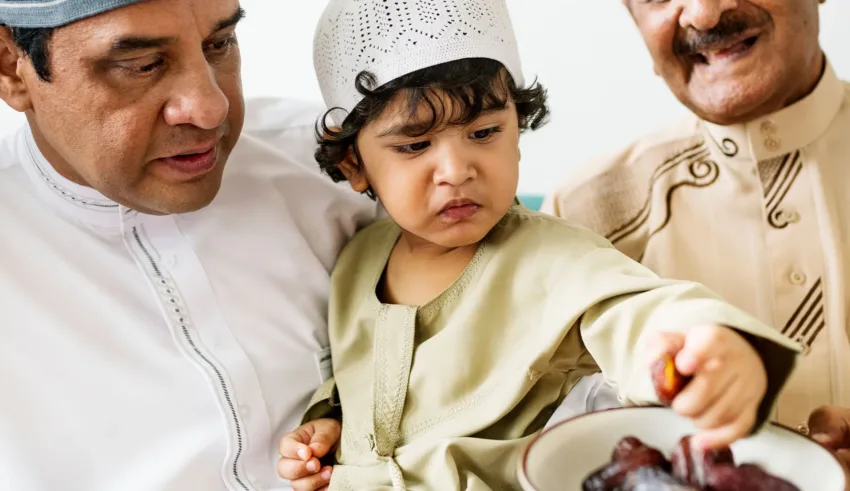
During Ramadan, Muslims around the world unite in the daily ritual of fasting from dawn to dusk. During this blessed month, Muslims need to follow a healthy diet that will provide energy and nourishment throughout the day and prevent health problems.
People often break their fast with massive feasts filled with various dishes, sweets, and fried foods, which leads to increased cholesterol levels, even diabetes, and weight gain, the opposite of the purpose of fasting. Rather, you should follow 7 simple habits during Ramadan for a healthier lifestyle.
Ramadan is a great opportunity to develop good habits that will stay with you even after the holy month is over.
What are the healthy habits during Ramadan?
1- Breaking the fast with dates
Muslims around the world have a religious tradition of serving dates at their Ramadan iftar table. Dates are an optimal and healthy choice for an empty stomach. They are rich in sugar, fiber, minerals, phytonutrients, and vitamin C. They also contain potassium, magnesium, iron, and small amounts of protein and fat.
You can also try other dried fruits like apricots, figs, raisins, or prunes, which also provide fiber and nutrients.
2- Eat mindfully
It can be tempting to eat as much as you can to make up for not eating all day, but you need to slow down and think about your eating habits.
If you overeat, you will feel terrible after iftar and you may have other health problems.
When iftar comes, try to eat mindfully by taking small bites and chewing carefully. This way, you will enjoy your meal and your digestive system will have an easier time digesting the food you eat.
During Ramadan, make a habit of eating healthy foods rich in fiber, protein, and complex carbohydrates, such as lentils, cereals, dates, whole wheat, eggs, yogurt, meat, vegetables, and fruit. These foods will keep you energized throughout the day.
3- Stay hydrated
During Ramadan, it can be difficult to drink enough water, but staying hydrated plays an important role in staying healthy during the holy month.
Not drinking water can actually be dangerous because of the severe health risks that come with dehydration. Fortunately, it’s easy to combat dehydration during Ramadan by adopting healthier habits into your iftar routine.
Keep a bottle of water handy throughout the evening and try to drink a cup or two at least every hour. Avoid caffeine; if you feel like a cup of tea or coffee, try replacing it with fruit drinks, especially water-rich fruits like cucumbers, apples, watermelon, and berries.
4- Limit fried, sugary, and processed foods
Many people find fried and processed foods delicious and tend to serve them at the iftar or suhoor table. However, these foods tend to be high in calories and trans fats. Eating a lot of these foods can have negative effects on your health.
Ramadan is the perfect time to follow a healthy diet that can last all year and prevent health problems.
Instead of frying potatoes, for example, you can bake or boil them and add various spices and herbs. To develop healthy habits during Ramadan, you can also replace sweet and processed foods with soups, vegetable salads, dairy products, or fruits.
5- Replace sugary desserts with fruits and vegetables
Desserts and sugary foods are low in nutrients and high in calories. They can lead to obesity and other health complications if eaten daily and in large portions.
Vegetables and fruits are rich in vitamins, minerals, and fiber and provide a lot of nutrients for so few calories.
Fruit is a great substitute for desserts. They provide natural sugars for energy and fluids to help you stay hydrated throughout the day. Vegetables are also high in fiber, which helps you feel full.
There are many ways to enjoy fruits and vegetables in iftar or suhoor meals. You can make veggie soups, salads, smoothies, or just snack on various fruits between meals.
6- Participate in physical activities
Many Muslims take advantage of Ramadan to lose weight, or they just like to stick to their usual workout routine during the holy month.
It can be difficult to get into a full workout while fasting. Your body will need food and fluids afterwards, so it’s best to stick to light exercise and participate in physical activities just before iftar or in the evening.
Exercising during Ramadan can help you stay healthy, get your blood flowing and keep all your body functions working properly. Listen to your body when you exercise and be careful not to overstress yourself.
7- Get enough sleep
One of the most common times when sleep patterns change is during Ramadan. Getting enough sleep at night during the holy month is a struggle for many Muslims, especially those who continue to work or study during the fast.
Sleep deprivation can be deeply unpleasant. It disrupts your natural rhythm, makes you tired and anxious and, in extreme cases, can cause physical and mental problems.
It is essential to get at least six to eight hours of sleep a day in order to get enough mental and physical rest to stay energized and productive the next day.
You can try going to sleep and waking up at the same time each day to get your body used to a better sleep routine.
Also, avoid eating processed foods and fast food before bedtime, as well as stimulants such as coffee, soft drinks, and chocolate.
What tips should pregnant women follow during Ramadan?
- Consult your doctor before starting to fast during Ramadan to ensure that it is safe for you and the baby.
- Eat a healthy, balanced diet that contains all the necessary nutrients and calories.
- Chew your food well to avoid indigestion.
- Vary your food and choose snacks between Iftar and suhoor.
- Avoid overeating and exceeding daily caloric requirements for a healthy pregnancy and avoid excessive weight gain.
- Limit fatty, fried, and sugar-rich foods and drinks. Avoid soft drinks and caffeinated beverages.
- Avoid salty foods, fast food, and processed meats.
- Increase your intake of dietary fiber, such as vegetables and fruit, which promote digestive health.
- Drink enough water.
- Exercise and engage in daily activities as directed by your doctor.
Understand your nutritional needs
It is important to eat a balanced iftar, as this is the meal that allows you to replenish your energy stores and continue your fast the next day. You need to make an extra effort to eat the right foods to get the nutrients your body needs. Ramadan is an opportunity to cultivate good eating habits that will stick with you after the fasting month is over.
Ramadan is indeed a sacred time of year and fasting is an important part of this holy month, but as you can see, there are many options for fasting while staying healthy and nourished.
Ramadan Kareem!









